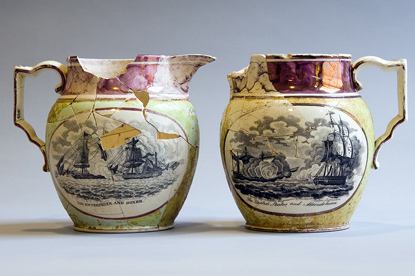Thomas Jefferson was never more wrong. In late June 1812 he wrote to his friend Thaddeus Kosciuszko that no war had been “entered into under more favorable auspices” and that “[o]ur present enemy will have the seas to herself, while we shall be equally predominant at land, and shall strip her of all her possessions on this continent.”
Astounded by defeats, the British admiralty ordered its captains to avoid single ship actions and proclaimed that battles against the super frigates were not even contests.

NPS
In reality, the American army quickly experienced a series of horrendous reverses, while the navy gained triumph after triumph in exploits that proved an important tonic for the United States.
On August 13, 1812, Captain David Porter’s frigate the Essex captured the smaller Alert, the first British ship to surrender to the Americans in the war. Under Captain Isaac Hull, the Constitution gained fame before even fighting a battle by escaping the clutches of several British ships off New York Harbor in July when, in an act of seamanship and fortitude, the ship outran the British in a calm by using kedge anchors (the ship’s boats rowed the anchors in front of the Constitution and then used the capstan to crank the ship forward) to keep ahead of the pursuit. When a gust of wind finally appeared, the Constitution got clean away. Once at sea, the Constitution defeated the Guerriere on August 19, 1812, pounding the smaller and outmanned frigate so badly it had to be sunk. It was in this battle that the Constitution earned its nickname “Old Ironsides” because the strength of the oak on the sides of the ship hardly gave way when struck by the Guerriere’s shot.
The record of the American “super frigates” continued when the United States, under captain Stephen Decatur, captured the Macedonian on October 25, 1812, bringing its battered prize safely back to New York. The Constitution, under the command of William Bainbridge, destroyed the Java in a fierce battle in the South Atlantic on December 29, 1812. Astounded by these defeats, the British admiralty ordered its captains to avoid single ship actions and proclaimed that battles against the super frigates were not even contests.
The Royal Navy was right; the victories of the Constitution and the United States were unequal contests. The American super frigates were the top of their class. Designed in the 1790s originally to deal with the Algerian crisis in 1794, they were as fast as any ship afloat, had more firepower, and carried more men than the average British frigate. They were so big that in the right conditions they might have been a match for the smallest of the first-rate British ships (more than 64 guns), although they were dwarfed by the bigger ships of the line carrying upwards of 100 guns. But there were only six super frigates at the beginning of the war. The rest of the navy was comprised of smaller frigates like the Essex, which was almost half the tonnage of the Constitution, or brigs and sloops of war of even lesser size.
Part of a series of articles titled “The Luxuriant Shoots of Our Tree of Liberty:” American Maritime Experience in the War of 1812 .
Last updated: March 6, 2015
